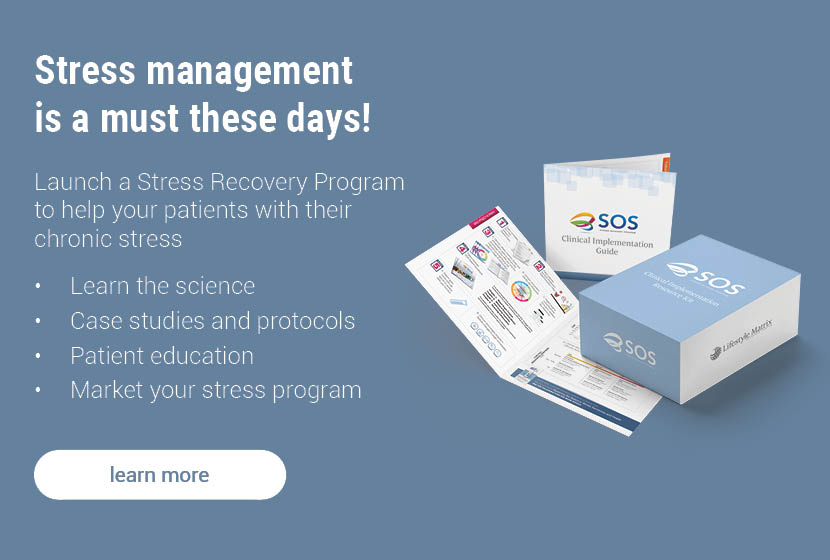Stress in appropriate amounts can be beneficial for the body to function better and stay healthy.1 As much as stress is a normal component of daily life, stress in abundance leads to illness and eventually chronic disease conditions.2 In this post, we will define stress, explain how it affects immunity and provide long-term strategies for reducing stress.
What is Stress?
Stress comes in many forms and affects each of us in different ways. The definition of stress per Hans Selye, who has been commonly referred to as the “father of stress research,” is a non-specific response of the body to any demand for change.3 We all experience stress to a certain degree and our perception of it determines the response and the extent of damage it causes. Stress is nuanced; what is stressful to one individual is not always stressful to another. One example is giving a speech in front of a large audience. This could be exhilarating for one person and terrifying to another.
As a clinician, I could sense a patient’s anxiety by observing their body language, noticing tense muscles due to shoulders being raised toward their ears, or by a short response to a simple question asked. It is also important to understand that stress on the body isn’t always emotional in nature. A few other obvious contributors are blood sugar dysregulation, inflammation and sleep disturbance. For a more in-depth look at these stressors, please refer to a post written by Dr. Christopher Mote on the LMRC blog.4
Stress and the Immune System
During times of stress, the nervous system is on alert and hormones and neurotransmitters are released. Cortisol is one of those hormones and gives the body a boost of energy and keeps systemic inflammation under control. If stress continues without reprieve, cortisol can become catabolic, making it difficult for tissues to recover. In this way, the stress response system stays “switched on” and other regulatory systems of the body become disrupted, such as immune function. Systemic effects of elevated and prolonged stress contribute to inhibition of many functions of lymphocytes, macrophages and leukocytes.5 Concurrently, stress may decrease production of many cytokines and other mediators of specific inflammatory molecules. In short, chronic stress alters the body’s ability to fend off infection and inflammation by limiting and debilitating key components of the immune system.
Strategies to Reduce Stress
Was it the chicken or the egg? Did stress cause the immune system to become out of balance, or did the immune system cause stress and HPA axis dysfunction? It is likely both putting strain on each other. Once this cycle is out of balance, a variety of physical and mental health conditions ensue. These conditions range from chronic fatigue, metabolic disorders like diabetes, depression and immune disorders.
As a health care provider, it is difficult at times to determine “who started it.” In any case, we must ask questions to know which diagnostic lab tests to run and determine which body system needs attention first. If we use a questionnaire, such as the 4 Key Stressors Questionnaire from the SOS Stress Recovery Program, we can zero-in on what area(s) need to be addressed. If the inflammation and mental stress categories are top priorities per the questionnaire, then we can follow the testing decision tree from the In-Practice Guide to trigger us to run baseline labs for oxidative stress markers along with testing HPA axis function via salivary cortisol testing. This will equip us with results that inform tailored lifestyle and nutrient recommendations, or even further testing for infections and treatment with specific protocols.
Though each patient case is unique, here are some general stress management strategies:
- Maintain healthy social support and sense of community.
- Get adequate sleep for your age and activity level.
- Exercise an appropriate amount for your age and health.
- Take nutritional supplements to decrease the effects of stress, manage symptoms, resync the natural circadian rhythm and replenish deficiencies (i.e., adaptogens, neurotransmitter support).
Conclusion
We’re definitely not short on stress these days. We are all managing common life stressors such as worry about the future of our nation, finances, work, current political climate, and violence.6 As we weather a global pandemic, we’re adding to that list social isolation, disconnected communities, and high levels of anxiety and uncertainty. While we don’t necessarily want to live “stress-free” (stress does challenge the body in healthy ways, too) 7, we can see the negative impact of chronic stress, or acute plus chronic stress, on health and wellbeing. Let’s all be mindful of learning how to cope with our stress and use the strategies presented here as a step in a positive direction. As I always tell my patients, use stress for its benefits and leave the rest behind!
References
- Pruett, S. Stress and the immune system. Pathophysiology. 9 (2003) 133-153.
- Guilliams, T. The Role of Stress and the HPA Axis in Chronic Disease Management. The Standard Road Map Series, Second Edition. 2020. ISBN: 978-0-9856158-7-1.
- Siang Yong Tan, MD, A Yip, MS. Hans Selye (1907-1982): Founder of the stress theory. Singapore Med J. 2018 Apr; 59(4): 170-71.
- https://www.lifestylematrix.com/blog/the-4-key-stressors-and-nutritional-support-protocols-for-rebuilding-stress-resiliency/
- Black, P. Central Nervous System-Immune System Interactions. Psychology of Stress and its Immune Consequences. Antimicrobial Agents and Chemotherapy. 1994 Jan; 38(1): 1-6.
- American Psychological Association, Stress in America: The State of Our Nation. Released October 2020.
- Segerstrom, S., Miller, G. Psychological Stress and the Human Immune System: A Meta-Analytic Study of 30 Years Inquiry. Psychological Bulletin. 130(4):601-30.

Stacey Smith, DC
Stacey Smith, DC earned her doctorate in chiropractic from the National University of Health Sciences (NUHS) in Lombard, Illinois in 2004.?She obtained two bachelor of science degrees, biochemistry from Michigan State University and human biology from NUHS.?She worked alongside her chiropractic parents and brother in a family practice in Michigan for 16 years and focused on lifestyle and physical medicine.?She continues her education of integrative evaluation and treatment practices through functional medicine coursework and utilizes her research and clinical background as the SOS Stress Recovery Program Brand Manager.




